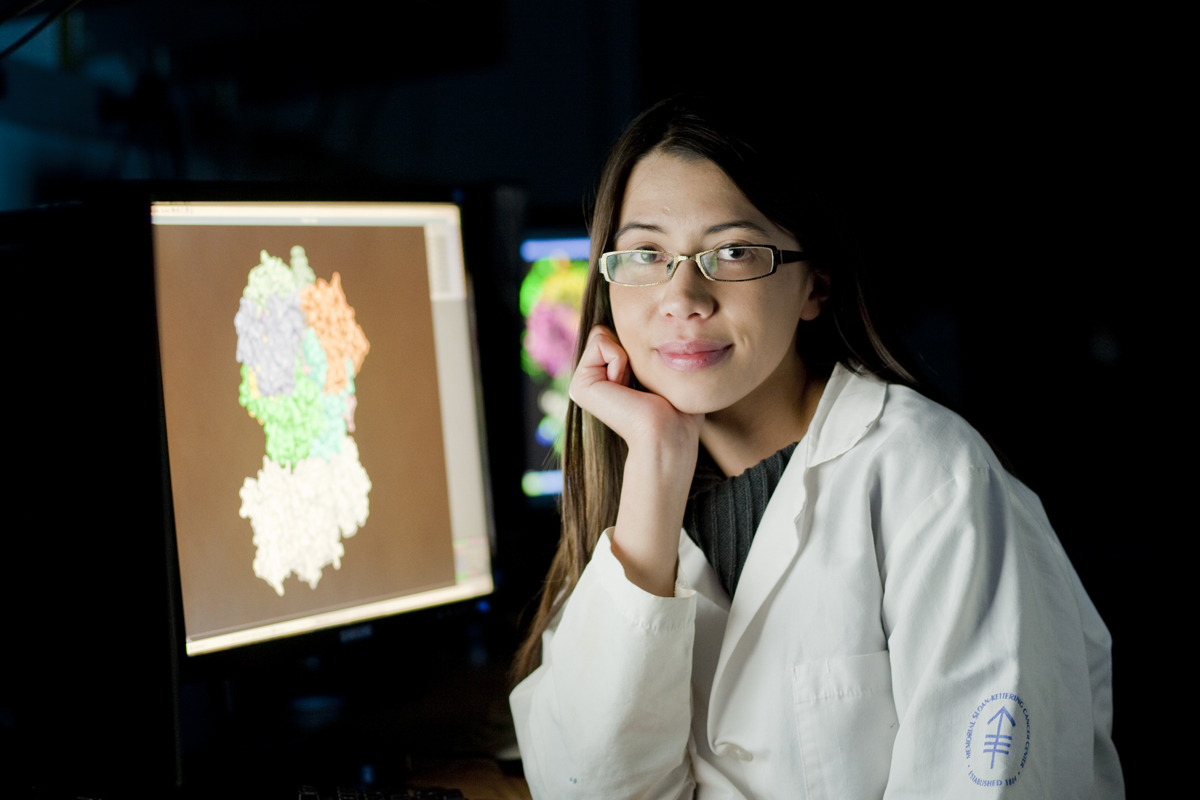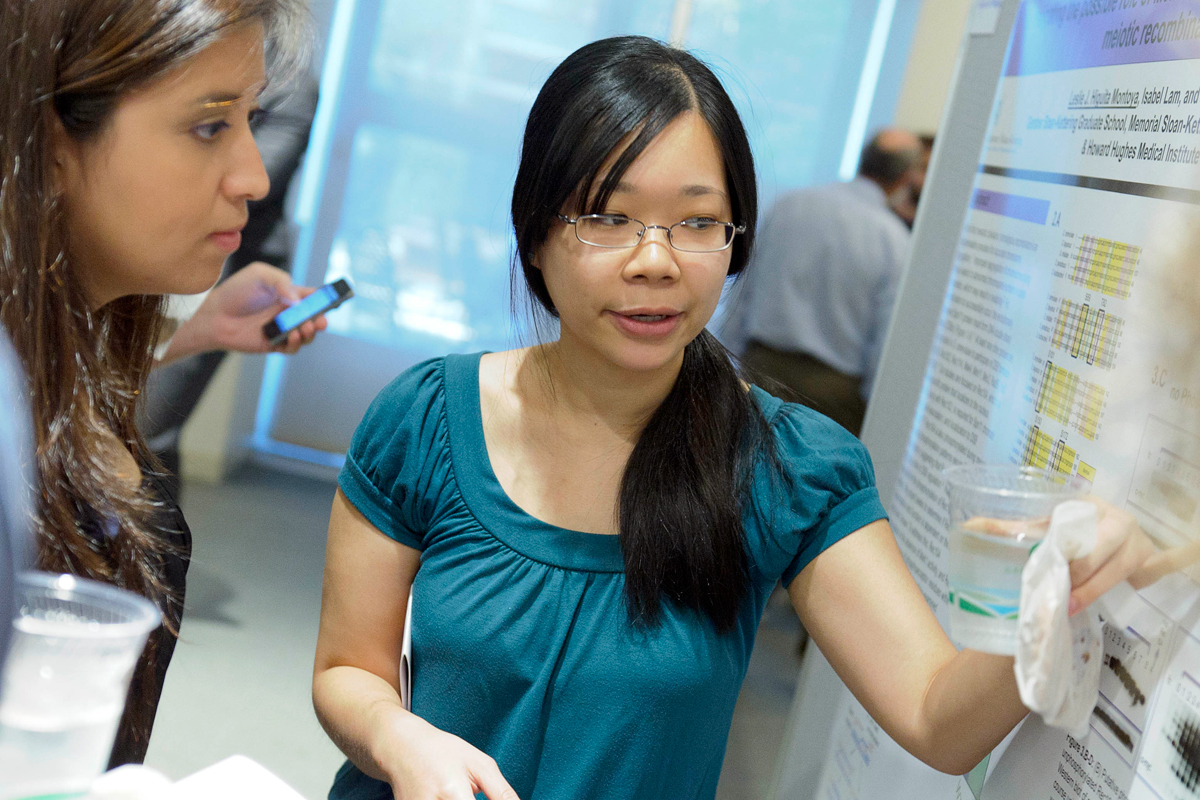
Marta Kovatcheva
Marta Kovatcheva, a second-year student, has received a Natural Sciences and Engineering Research Council (NSERC) Postgraduate Scholarship (PGS). Since the agency’s inception in 1978, these scholarships have been providing financial support to high-caliber students engaged in master’s or doctoral programs in the natural sciences or engineering. The support allows scholars to fully concentrate on their studies and seek out the best research mentors in their chosen fields both within Canada and abroad.
Marta’s undergraduate work was at the University of Toronto, where she majored in molecular genetics and minored in mathematics. Her senior thesis work was completed under the mentorship of Daniel Durocher at the Samuel Lunenfeld Research Institute. She studied the role of a novel E3 ubiquitin ligase protein in signaling the occurrence of double-strand breaks and mediating downstream cell-cycle arrest and DNA damage repair.
Marta recently joined Andrew Koff’s lab in the Molecular Biology Program for her dissertation work. Her thesis project is related to liposarcoma, a soft tissue tumor, for which there are currently no approved targeted chemotherapies and for which surgery is the only option. However, there is a cell-cycle inhibitor drug in clinical trials that has shown some promise in treating a subset of patients with this disease. To understand who might benefit from such treatment, the laboratory has been working with a panel of patient-derived liposarcoma cell lines, seeking to detect molecular differences that may underlie patient response. Studies in the lab have classified these cell lines as “responders” or “non-responders.” Responders undergo cellular senescence, a form of quiescence that has important implications for limiting the proliferative capacity of cancer cells, while non-responders exhibit reversible growth arrest but do not show any of the classical markers of senescence. Marta’s goal is to develop insight into the pathways by which these cells detect the signals that cause senescence, or how they act upon those signals. To accomplish this she will employ genome-wide transcriptional analysis, proteomic approaches such as SILAC, cell biology, and biochemistry to explore the molecular events downstream of growth arrest.

Elizabeth Wasmuth
Isabel Lam and Elizabeth Wasmuth, both fourth-year students, have been awarded the NIH’s Ruth L. Kirschstein National Service (NRSA) Award. The award’s emphasis is on developing a diverse US community of highly trained scientists contributing their scholarship to global biomedical, behavioral, social, clinical, and health services research, as well as scholarship.
Elizabeth is a graduate student in Christopher Lima’s lab in the Structural Biology Program. She received her undergraduate degree from Cornell University where she worked in the lab of Dr. Xingen Lei and studied the molecular basis for increased iron absorption in the guts of anemic pigs in response to the structural carbohydrate inulin. After graduation in 2007, Elizabeth spent a year as a predoctoral fellow in the lab of Forbes Porter at the NIH, researching the mechanisms underlying Smith Lemli Opitz syndrome, an inborn disorder of cholesterol biosynthesis, using cellular and genetic methods. Her interest in x-ray crystallography developed while at the University of Colorado Health Sciences Center for an undergraduate research program where she spent a summer in the lab of Mair Churchill characterizing a protein-DNA complex involved in transcription.
Elizabeth’s thesis research focuses on RNA decay, and understanding how one of the cell’s major exoribonucleases, the RNA exosome, functions. The exosome is involved in RNA processing, maturation, degradation, and quality control in the nucleus and cytoplasm. Disruption of exosome-mediated processes is associated with diseases such as cancer and autoimmune disorders. Of particular interest is the characterization of the protein factors that regulate exosome-dependent RNA maturation and processing versus exosome-dependent RNA degradation. To address the basis for this substrate specificity, she employs structural, biochemical, and genetic approaches.

Isabel Lam
Isabel’s research in Scott Keeney’s lab in the Molecular Biology Program is on the mechanism of meiotic recombination initiation in budding yeast. Meiosis is a specialized cell division that generates spores or gametes that are half the genome equivalent of the progenitor cell. A critical aspect of meiosis is the faithful segregation of homologous chromosomes at the first meiotic division; improper segregation results in aneuploidy. In most organisms, meiotic recombination connects the maternal and paternal chromosomes, thereby promoting accurate chromosome segregation. Meiotic recombination is initiated by the formation of programmed DNA double-strand breaks (DSB) catalyzed by the Spo11 protein. Meiotic DSB formation is a highly regulated process — DSBs must only happen at the right time and place so that the toxic lesions are properly repaired, yet the mechanism for this regulation is not understood. In yeast, several proteins are required for Spo11 to make DSBs, including Rec104, but its precise molecular role is unknown. One possibility is that Rec104 is involved in regulating DSB formation. For her thesis project, Isabel is investigating the role of Rec104 phosphorylation to gain a better understanding of the molecular mechanism and regulation of meiotic DSB formation.